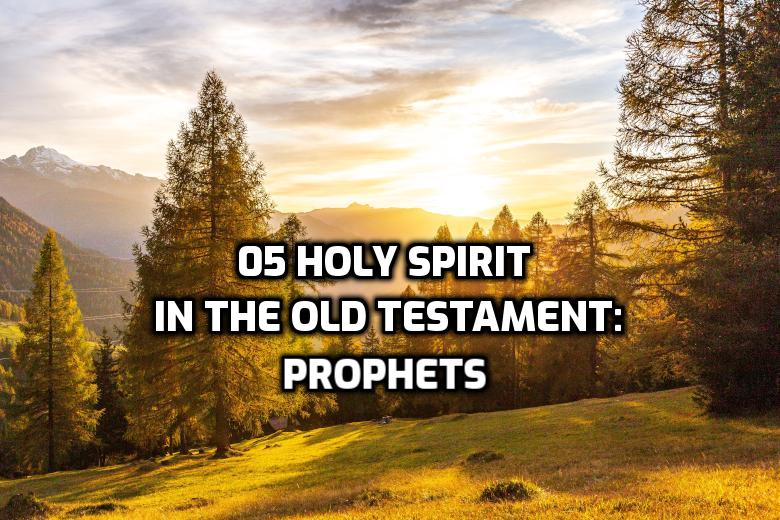Most of the Old Testament references to the Holy Spirit involve his work empowering the leaders of Israel to protect the nation. But a second way we see the Spirit of God working in the Old Testament is giving revelation to the prophets.
Passages: Numbers 11:14-29; 1 Samuel 10:5-11; 1Samuel 19:18-24; 2Samuel 23:2; Acts 1:15-16; Acts 4:23-25; Hebrews 3:7; Zechariah 7:12; 2 Peter 1:21; Isaiah 11:1-4; Isaiah 42:1; Isaiah 62:1-2; Zechariah 4:6.
Review
- The Holy Spirit is God’s agent of change in this world.
- Broadly speaking his work can be categorized as: universal and individual.
- The universal work of the Spirit is the work that the Holy Spirit does in all believers to give us saving faith.
- The individual works of the Spirit are the gifts and opportunities to serve the kingdom of God that the Spirit gives one believer but not another.
- Revelation is an individual work of the Spirit given to God’s chosen messengers, such that they can teach God’s word to the rest of us.
- Understanding is the receptivity to embrace and believe God’s message as wisdom, which is a universal work given to all believers.
- Most of the discussion of the Holy Spirit in the Old Testament concerns the individual work of the Spirit empowering particular individuals as judges and kings to protect, defend and guide Israel.
This podcast explores another way we see the Spirit of God working in the Old Testament: giving revelation to the prophets.
Moses
- Numbers 11:14-29.
- Moses is burdened by the continuous grumbling of the people and he tells God that he can’t do it alone anymore.
- God sends upon 70 elders the same Spirit that has been at work in Moses.
- They begin to prophesy in a spontaneous event as tangible evidence that God has chosen these elders to lead alongside Moses.
- This ability to prophesy comes about because the Spirit of God comes upon them.
Saul
- 1Samuel 10:5-11.
- After Samuel anoints him as king, Saul is equipped by the Spirit for his new role as King.
- One of the signs that God is with him is that he prophesies.
- 1 Samuel 19:18-24.
- Later in Saul’s life, he prophesies again; only this time Saul testifies that David is King.
- This later prophesying is also an individual work of the Spirit given to Saul.
In these cases, the content of the prophesy is not mentioned because the significance of the event is that God is with the person prophesying.
David
- 2 Samuel 12:1-3.
- David did not hold the office of prophet, but he claims he wrote the words of God in his psalms by the equipping of the Holy Spirit.
- The New Testament authors confirm that David’s words were empowered by the Spirit: Acts 1:15-16; Acts 4:23-25; Hebrews 3:7.
The Prophets
- The prophets tell us they speak the word of the Lord because of the individual activity of the Spirit of God in their lives.
- For example: Isaiah 48:16-17; Ezekiel 2:1-2.
- Zechariah 7:12 tells us all the former prophets spoke words sent by the Spirit of God.
- The New Testament confirms that the prophets spoke because of the activity of the Spirit in their lives: 2 Peter 1:21.
The Servant
- In the Old Testament, the Spirit empowers the leaders of Israel to equip them for their leadership roles.
- The Spirit gives revelation to the prophets so that they can deliver the words of God to His people.
- In King David, we see both this equipping as king and giving of revelation.
- Like David, the Spirit of God also works both ways in the Messiah, the king who will come from David.
- The words of the prophet: Isaiah 11:1-4
- The words of God: Isaiah 42:1
- The words of the Servant himself: Isaiah 61:1-2
- Jesus confirms in Luke 4:16-21 that the words of Isaiah apply to him.
For more detail and explanation, please listen to the podcast.
Next: 06 Holy Spirit in the Old Testament: A New Heart
Previous: 04 Holy Spirit in the Old Testament: Judges & Kings
Series: Who is the Holy Spirit?
Photo by Damian Markutt on Unsplash
Season 16, Episode 5.
Page Views: 1,421
